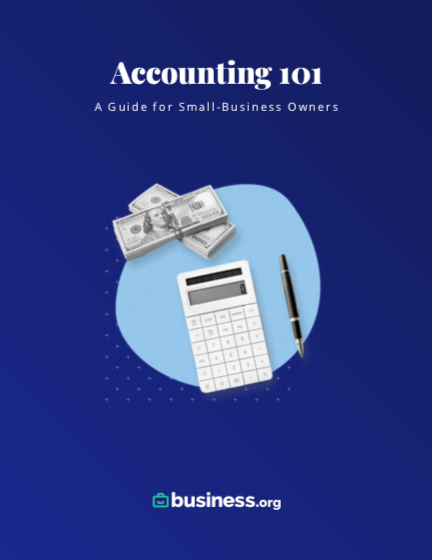We are committed to sharing unbiased reviews. Some of the links on our site are from our partners who compensate us. Read our editorial guidelines and advertising disclosure.
QuickBooks Self-Employed vs. QuickBooks Small Business 2025
Data as of 12/12/22. Offers and availability may vary by location and are subject to change.
The bottom line: In spite of their names, QuickBooks Online is actually best for most business owners, including self-employed freelancers. QuickBooks Self-Employed is too bare-bones for all but the smallest of businesses, but it can work well for tax-conscious freelancers who rely on end-of-year deductions.
QuickBooks Self-Employed is Intuit’s accounting solution for freelancers, while QuickBooks Online is Intuit’s more fully featured small-business accounting software. QuickBooks Self-Employed could work for freelancers who want a stellar interface and easy integration with Intuit’s tax software, TurboTax. Meanwhile, QuickBooks Online’s high-value accounting features, third-party integrations, and additional users set it apart.
- : QuickBooks Self-Employed
- : QuickBooks Online
- : QuickBooks Online
- : QuickBooks Online
Overall Intuit QuickBooks strengths and weaknesses
Before deep-diving into how QuickBooks Self-Employed differs from QuickBooks Online for small businesses, let’s talk about what we like and don’t like about QuickBooks' online products in general.
Shared QuickBooks strengths
All QuickBooks accounting products (with the exception of some QuickBooks Desktop plans) have incredible mobile accounting apps that are user-friendly and straightforward for on-the-go freelancers and employers alike.
Second, QuickBooks’ cloud-based accounting solution is ridiculously easy to use and was made for small-business owners first. While FreshBooks and Xero rival QuickBooks’ ease of use, QuickBooks’ sleek interface and user-first approach keep it ahead of the curve (at least for now).
Shared QuickBooks weaknesses
As is typical of Intuit products, both QuickBooks Self-Employed and QuickBooks Online have higher starting prices than most other freelance and small-business accounting plans on the market.
If you want to collaborate or add users to a growing business, QuickBooks’ small-business user limit maxes out at 25. A product like Xero, which has unlimited users, or FreshBooks, which lets you add users as your business grows for a monthly fee, might work better for you than a QuickBooks product.
By signing up I agree to the Terms of Use and Privacy Policy.
Best basic bookkeeping features: QuickBooks Self-Employed
If you’re a freelancer who works just a few small jobs a month, QuickBooks Online for small businesses might be too complex for your needs. In that case, you’ll want QuickBooks Self-Employed, which sticks to bookkeeping basics:
- Business expense tracking
- Receipt scanning and organization
- Basic annual reports (like profit and loss statements)
- Automatic mileage tracking
- Quarterly tax estimation
- Basic invoice creation
- Basic payment acceptance (via invoice)
These features can help you track basic income, get paid on time, and make the most of your end-of-year tax deductions. They’re also ideal for helping you separate business expenses from personal expenses—which is a crucial financial step for every small-business owner, including freelancers working just a few jobs a year.
What they can’t do is help you grow your business. You can’t track your cash flow at less than an annual level, turn estimates into invoices, or look at big-picture financial reports to trim losses and up profits—and for many freelancers, that’s perfectly fine.
If you want basic help tracking your side gig’s income separately from your personal finances, QuickBooks Self-Employed fits the bill. But if you want to eventually grow your business from a smaller venture into a larger company, potentially one with partners and employees, QuickBooks Online Simple Start will work better.
At $15 a month, QuickBooks Self-Employed is at the higher end of freelance accounting software. Most of QuickBooks’ main competitors charge less: Zoho Books is free for businesses with less than $50K in annual revenue, Xero starts at $12 a month, and Wave Accounting is completely free. (Like QuickBooks Self-Employed, FreshBooks also starts at $15 a month, but its invoicing is notably better than QuickBooks Self-Employed.)

With plans starting at $15 a month, FreshBooks is well-suited for freelancers, solopreneurs, and small-business owners alike.
- Track time and expenses
- Create custom invoices
- Accept online payments
Best accounting features for growing businesses: QuickBooks Online
Whether you’re a freelancer hoping to expand your client base or small-business owner with employees, QuickBooks Online for small businesses has more of the tools you need to actively grow your business.
For ten dollars more than QuickBooks Self-Employed, QuickBooks Simple Start (the most basic QuickBooks small business plan) does everything QuickBooks Self-Employed does, and then some:
- In-depth cash flow tracking, including cash flow forecasting
- Customized estimates with mobile signature acceptance and invoice conversion
- Automatic sales tax calculation and tracking
- End-of-year 1099 tax form preparation
- Integration with ecommerce tools like Shopify
Pay particular attention to QuickBooks Simple Start’s ecommerce integration. If you sell physical products, you can’t use QuickBooks Self-Employed—at least, not if you want to integrate your bookkeeping software with your sales apps. (The lack of ecommerce integration helps explain why QuickBooks Self-Employed lacks a sales tax tracking feature, but it’s still annoying.)
Bookkeeping usually refers to the process of keeping your financial records in order, while accounting refers to using that financial information to make informed business decisions. Software like QuickBooks Self-Employed can help you keep accurate financial records, but it doesn’t offer many analytic tools. In contrast, QuickBooks for small businesses includes bookkeeping and accounting features, like profit and loss tracking and management.
Pricier QuickBooks Online plans add even more analytics and more thorough accounting and bookkeeping features:
- Additional users (up to 25 with QuickBooks Online Advanced)
- Bill management, including scheduled payments and fee-free online bill pay
- Time, project, and inventory tracking
- Batched recurring invoices and bill payments
These more extensive accounting tools are best suited to growing businesses with plenty of bills to manage and projects to track. And since QuickBooks’ small business plans allow for multiple users, they also work best for businesses in which multiple people have eyes on the books, like multi-partner LLCs or large corporations with a full accounting department. (Both QuickBooks Simple Start and QuickBooks Self-Employed allow for only one user.)
Sole proprietors, on the other hand, should do well with either QuickBooks Online Simple Start or QuickBooks Self-Employed. QuickBooks Online still includes quarterly estimated taxes and tax deduction optimization—its plans just offer more accounting help alongside the basic QuickBooks Self-Employed features.
Best value for price: QuickBooks Online
QuickBooks Self-Employed is cheaper than QuickBooks Online—so shouldn’t it have the best value for the price? You’d think so, but frankly, QuickBooks Self-Employed doesn’t have enough features to justify its high cost. And that’s just talking about the basic Self-Employed plan, not the higher-priced tax bundles, which—for most businesses, anyway—aren’t worth the price.
QuickBooks Self-Employed plans and pricing 2023
Data as of 12/12/22. Offers and availability may vary by location and are subject to change.
Unless you’re already planning to use TurboTax to file during tax season, we don’t recommend either of the QuickBooks Self-Employed tax bundles. The extra tax features aren’t worth an entire $25 a month—especially when you don’t get any extra accounting and bookkeeping features along with the increased price. If you want more features at a cheaper price, we recommend Wave (which is free) or Xero (which is $12 a month).
To learn more about filing your self-employment taxes, read this article.
QuickBooks Online has one of the higher starting prices of most popular accounting tools. In fairness, though, it also has more (and better) features than a lot of top competitors.
For instance, with QuickBooks’ built-in time tracking, project tracking, and inventory management, you don’t have to pay extra for a third-party solution (unless you want to). Unlike Xero, QuickBooks includes business expense management with every plan QuickBooks Self-Employed is cheaper than QuickBooks Online—so shouldn’t it have the best value for the price? You’d think so, but frankly, QuickBooks Self-Employed doesn’t have enough features to justify its high cost. And that’s just talking about the basic Self-Employed plan, not the higher-priced tax bundles, which—for most businesses, anyway—aren’t worth the price.
And while it’s frustrating that QuickBooks limits user numbers by plan, we like that the user pricing is built into the overall cost. (In contrast, each FreshBooks plan has unlimited users—but you’ll pay an extra $10 a month for each one, which quickly inflates the overall price.)
QuickBooks Online plans and pricing 2023
Data as of 11/9/22. Offers and availability may vary by location and are subject to change.
Best third-party integration: QuickBooks Online
Since QuickBooks Online and QuickBooks Desktop are two of the most popular accounting software in the world, they integrate with just about any third-party app you can think of. Along with other QuickBooks and Intuit programs like TurboTax and QuickBooks Payroll, they sync with dozens of third-party apps for inventory management, time tracking, project management, payroll—and virtually anything else you can think of.
In contrast, QuickBooks Self-Employed doesn’t sync with much beyond TurboTax. Most importantly, it doesn’t sync with popular payment acceptance and ecommerce apps, including Square and Shopify. So if you sell a service (like landscaping or editing), you can use QuickBooks Self-Employed. But if you sell on Amazon, Etsy, or eBay, you’ll likely get more out of an accounting solution that syncs with ecommerce apps.
The takeaway
Even though QuickBooks Self-Employed is geared towards freelancers, we still recommend QuickBooks Online over Self-Employed for most freelancers, contractors, sole proprietors, and other small-business owners. It has more accounting features that help you track your profit and loss, find new ways to grow your business, and collaborate with extra users.
However, if you’re looking for a streamlined bookkeeping solution with excellent quarterly tax estimation features and mileage tracking, QuickBooks Self-Employed is a good option. It’s not the cheapest freelance software out there, but its user-friendly interface and exceptional mobile app help justify its above-average price.
Not interested in either QuickBooks product? Read through our list of QuickBooks alternatives, most of which have a cheaper starting price and can work for freelancers and midsize business owners alike.
Related content
QuickBooks Self-Employed vs. QuickBooks Online FAQ
QuickBooks Small Business is a general term for the QuickBooks’ small business plans: QuickBooks Simple Start, Essentials, Plus, and Advanced. All four QuickBooks Online plans cater to small businesses, from sole proprietorships to large corporations. You can use QuickBooks Online to manage bill payments, send invoices, manage 1099 contractors, and much more depending on the plan you choose.
In contrast, QuickBooks Self-Employed is focused on basic bookkeeping for freelancers and others who file their taxes as sole proprietors. Since it was built for people who attach Schedule C forms to their income tax forms, its quarterly tax estimation, mileage tracking, and built-in tax optimization are incredibly thorough. QuickBooks Self-Employed also gives you basic financial tracking tools, such as simple income tracking and end-of-year profit and loss assessments.
No. QuickBooks Online has four plans for small businesses. QuickBooks Self-Employed is a separate, standalone bookkeeping solution for freelancers. Our in-depth reviews of each product can give you a more thorough look at QuickBooks Self-Employed vs. Simple Start.
Can I use QuickBooks Self-Employed for an LLC?
If you file a Schedule C form as part of your end-of-year taxes, you can likely use QuickBooks Self-Employed. Typically, that includes sole proprietors and single-member LLCs.
Other types of business owners—including multi-member LLCs, partnerships, S Corps, and C Corps—should not use QuickBooks Self-Employed to track finances or file taxes. Additionally, you shouldn’t use QuickBooks Self-Employed if you have employees (even just one). These types of businesses should all use QuickBooks Online or QuickBooks Desktop Premier, not QuickBooks Self-Employed.
Is QuickBooks Self-Employed worth it, or do I need QuickBooks for small businesses?
QuickBooks Self-Employed is more expensive than some other self-employed accounting options, but it might be worth it for freelancers who rely heavily on tax deductions (a.k.a. tax write-offs) to save money at the end of the year. Its quarterly tax estimation is helpful and accurate, as is its app-based mileage tracking. Its basic invoices and receipt-scanning features help you charge clients and keep your finances in order.
However, if you want features other than basic reports, bookkeeping, and tax assistance, we recommend QuickBooks Online or another accounting software program. QuickBooks Self-Employed has a higher starting price than many other freelance and contractor bookkeeping options, and it doesn’t have as many features as cheaper accounting companies like Wave Accounting.
Disclaimer
At Business.org, our research is meant to offer general product and service recommendations. We don't guarantee that our suggestions will work best for each individual or business, so consider your unique needs when choosing products and services.






